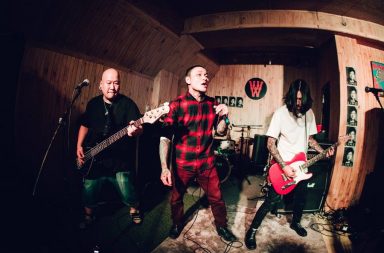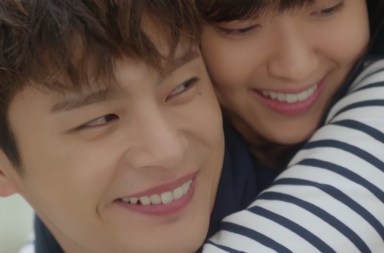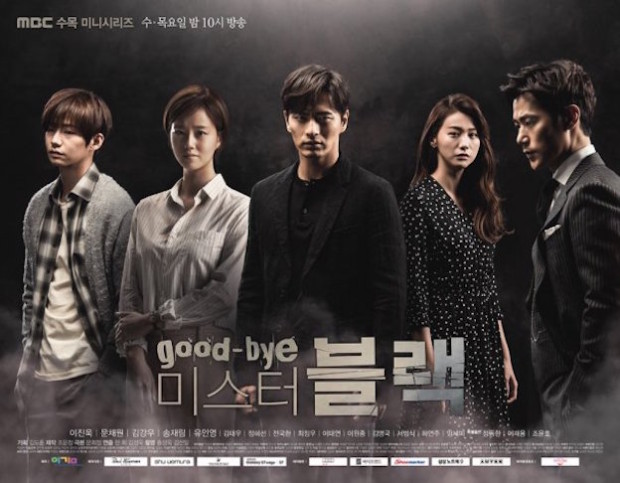 In a possible industry changing move, the MBC Show! Music Core chief executive producer (CP) Park Hyun-suk made a statement earlier this week pronouncing that the show is not going to allow singers or artists on stage that rely solely on MR (music recorded). According to him, about 10-20 percent of the singers who go on stage will lip-sync. At times there are cases where live recorded versions are being synchronized to — which in turn misleads the public into believing they are actually performing live. This declaration has since garnered positive support from fans, and if successful may have resounding effects on the industry.
In a possible industry changing move, the MBC Show! Music Core chief executive producer (CP) Park Hyun-suk made a statement earlier this week pronouncing that the show is not going to allow singers or artists on stage that rely solely on MR (music recorded). According to him, about 10-20 percent of the singers who go on stage will lip-sync. At times there are cases where live recorded versions are being synchronized to — which in turn misleads the public into believing they are actually performing live. This declaration has since garnered positive support from fans, and if successful may have resounding effects on the industry.
Lip-sync is not something limited to the K-pop industry. Notable cases on national programs have rocked some of the biggest global stars. Even artists that have built a reputation on being able to perform live have been caught lip syncing on some big occasions (see: Beyonce’s US National Anthem controversy). Even so, lip-sync continues to garner a negative association to the act because musical artists are supposed to maintain a high professional standard. It becomes a matter of showing the public the ‘real’ you and letting them decide whether or not your voice resonates with them. However, the parity in performance has become increasingly muddled with the addition of sound alteration such as autotune, assisted vocals, and/or lip-sync.
What makes K-pop an intriguing battleground for initiating live-only vocals is that the K-pop idol performance is heavily dance oriented. More and more groups are coming out with intricate dance numbers to accompany their songs. Hand in hand with intricate dance numbers is the burden placed on live vocals. If performed live, it is undoubtedly going to be strained and breathier than a pre-recorded vocal.
In addition, some K-pop companies continue to utilize certain choreographers who create dances that stress acrobatic movements, not allowing idols a chance to catch their breath and sing. As the pressure to match increasing difficulty in dance becomes more important in an oversaturated market, it is no wonder some idols do resort going down the path of lip-syncing. It has escalated to the point where it is almost impossible to compete without some degree of vocal assistance.
[youtube https://www.youtube.com/watch?v=DlkAdaBZwBs]The dubious nature of having some artists singing live while others are lip-syncing makes for an uneven playing field. If what we hear is simply a pre-recorded vocal or the album version of the song playing while they perform ‘live’, then why not just watch their music video instead? This is also the case when artists appear to be singing live, but the sound of their voices becomes muddled by the loud back track, which inhibits our ability to distinguish what is real from what is recorded.
Because of this, MR removed videos have become increasingly popular as fans want to know who can really sing while ousting or criticizing those who are faking it on stage. These videos are at times hard to trust because of the difficulty in erasing MR: not having access to instrumentals or when different MR tracks are utilized that fans do not have access to. With reference to this, the CP of Show! Music Core noted his disdain for the deception of lip-syncing to a pre-recorded live track. He was critical of this method because it fools the audience into believing these artists are actually singing live when they are in fact miming to a pre-recorded track.
There are some questions that are raised as to the implications of this new decree, and why MBC is choosing to fight this matter. Many fans are speculating whether there will suddenly be a dearth of idols from this music program. One particular company – SM Entertainment – has almost made it a standard that all comeback stages for their artists are lip-synced. Will this new decision from MBC effect the way SM manages their artists’ comeback stages?
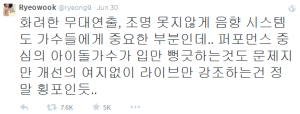 While many netizens have voiced their opinions the ban, statements from the idol side is limited. Although, Super Junior’s Ryeowook did send a tweet out rebuking the sole focus on this one element:
While many netizens have voiced their opinions the ban, statements from the idol side is limited. Although, Super Junior’s Ryeowook did send a tweet out rebuking the sole focus on this one element:
“The idols at the core of the performance who merely lip-sync are a problem but to focus on just the live (singing) and not improve other things just seems really tyrannical.”
The argument here is that music shows should also make improvements in their lighting, stages, and sound systems rather than only targeting those that choose to lip-sync. To be fair to him, there have been cases where sound systems have failed or stages have fallen apart below an artist’s feet. These concerns are worth noting, but they don’t address what the move can also effect.
What other possible repercussions could come about if this ban were to become an industry-wide standard? Artists may likely shift to more ballad-type songs in their performances. Also, the dance performance level may drop because of a need to focus on executing stable vocals. These considerations should be scrutinized along with questions on how music shows will implement the regulations on MR if this becomes an industry-wide standard – what level of vocal assistance will constitute banning. In any case, this decision is definitely only the tipping point in a broader discussion on K-pop and the live performance.
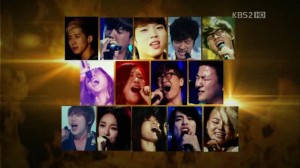 Even with the questions that arise from this announcement, there are a lot of prospects for this implementation. The shift from a dance-centric focus to one that is focused on the quality of voices will place a greater emphasis on those that can actually sing and/or those who work hard to hone their vocal craft.
Even with the questions that arise from this announcement, there are a lot of prospects for this implementation. The shift from a dance-centric focus to one that is focused on the quality of voices will place a greater emphasis on those that can actually sing and/or those who work hard to hone their vocal craft.
Perhaps this is why reality singing competitions have become such a popular emergence in the industry. Those who make it on those shows have proven their ability to put on a performance and actually sing live. This also extends to those idols who have taken to singing shows with a reputation for live singing to prove themselves. Shows such as I Am a Singer and Immortal Song highlight those that can stir emotions or excite with their voices. It would be shocking if a lip-sync scandal were to emerge from one of these shows as that would surely diminish the reputability of these shows.
At the core of it, there is a underlying desire for vocal talent to take the limelight, and some idols have proven that they are up to that challenge. Another intriguing question is whether this shift could also effect how the idol industry operates if only the vocally talented make the cut? Idols are a major influence on youth culture, so adding a tougher degree of professionalism and talent to the mix may mark a shift to what the youth aspire to become.
Whether MBC’s prohibition on miming becomes an industry-changer is all still speculative. There will surely be contention on the company and artist level. Whether there will suddenly be a slew of missing idols on Show! Music Core has still yet to be seen. The need to balance performance and singing is an issue – as the performance aspect makes K-pop a special package that has likely contributed to its mass global popularity. Instituting this change will surely inhibit many idols’ ability to pull off these elaborate performances.
Perhaps the answer is to present more veracity in indicating which artists are performing live and which ones are utilizing vocal assistance. Another possible route could be making MRs available to the public. If the desire of the CP is to be transparent to the public, then these methods could be the answer to that problem without completely eradicating vocal assistance or lip-syncing altogether.
Do you think the K-pop industry should eliminate lip-syncing and vocal assistance completely? Will this Show! Music Core decision have a large effect on other music shows? Will there be a shift to more vocally talented singers, or do you think there will there simply be a bunch of idols missing from this one music show?
(Munhwa Ilbo via Naver, Netizen Buzz, YouTube [1][2], Twitter, @WorldwideELFs, Sports Seoul, Newsis, Image via Asiabeam)
